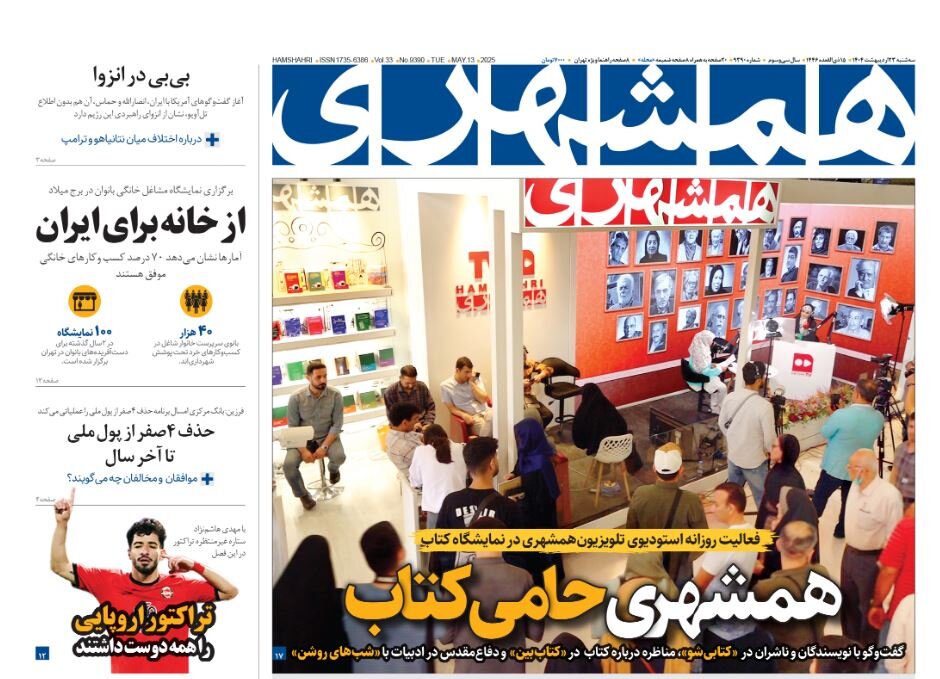Israeli media concerned about a possible agreement

TEHRAN - In an analysis, Hamshahri addressed Israeli concerns about the promising negotiations between Tehran and Washington on Iran’s nuclear program.
It wrote: Israeli media wrote that any agreement, even a weak one, could lead to Iran’s re-strengthening. Concurrent with the fourth round of the Iran-U.S. talks in Muscat, Israel’s tough stances have put pressure on the negotiations. Israel believes that an agreement similar to the JCPOA II, which only limits its nuclear program, would allow Iran to rebuild its economy and strengthen its proxy network, and would ultimately be detrimental to regional security. Recent developments show that Iran, although in a difficult situation, still has the means to resist. However, if Israel takes military action, especially without full coordination with the U.S., it could lead to wider tensions in the region. Given these conditions, Iran’s foreign policy must carefully manage these threats.
Ettelaat: The path to economic development
Ettelaat spoke with Yaghoub Rezazadeh, a member of the National Security and Foreign Policy Committee of the Parliament, about the U.S. oil sanctions against Iran. He said: In the context of the ongoing negotiations between Iran and the U.S., Donald Trump has shown that the United States cannot be trusted, as it imposed oil sanctions on Iran to pressure the Islamic Republic. Therefore, we must manage the negotiations in a way that does not repeat the JCPOA. We must appear authoritative in the negotiations and, by taking into account the difficult conditions we have in the economic sector, direct the negotiations in a way that will ultimately lead to the lifting of sanctions and, as a result, opening up the economy. Therefore, if we can pursue the preparations for trade with European countries without the interference of the United States, we can achieve important achievements by relying on our common potential. To achieve this, we must make the Europeans understand that Iran's dream with America does not justify their move to turn their back on Iran. In any case, we and the Europeans can reestablish trade and economic relations, which will also be important for European countries.
Etemad: Iran and US have entered into detailed issues
Etemad reviewed the fourth round of Iran-U.S. negotiations in an interview with Heshmatollah Falahatpisheh, a political analyst. He said: The two countries' planning for a fifth round means that both sides have tried to take into account each other's concerns and demands. The U.S. knows that the cost of reaching an agreement is much lower than no agreement. If there is no agreement, a wave of extensive costs will fall on the United States. Forbidding Iran from practicing its NPT rights for enrichment will have many costs for the United States. In the far corners of the world, many countries are enriching uranium without having nuclear weapons. This means that Iran cannot be deprived of these rights. Currently, more diplomatic shuttles are underway in the region, and Iran must promote this situation for economic and security relations. If regional relations are pursued in the form of collective security, Israel will be further isolated. Recent developments have shown that the United States does not want to act in the form of Netanyahu's security and military policies, and this is the greatest opportunity that Iran can and should use.
Iran: Important role of Oman as mediator
The Iran newspaper spoke with Mohammad Keshavarz-Zadeh, the former Iranian ambassador to China, about the importance of Oman's role in the recent round of negotiations between Iran and the United States. He said: Oman has played an active and effective role in maintaining the diplomatic channel and creating opportunities to explore new ideas. Although the United States tried to turn the Muscat talks into a prominent meeting by changing its media tone on some fundamental issues, it seems that it was Oman's active involvement that succeeded in managing the course of the talks. Also, Araghchi's consultations with important Arab players, including Saudi Arabia, Qatar, and the UAE, were a smart move that at least managed to prepare the regional atmosphere for holding calm and tension-free negotiations. Iran has managed to both engage regional countries in the diplomatic process and keep its Asian partners, such as China and Russia, on board. Now is the time for Washington to demonstrate its will to resolve the main differences, especially on issues like enrichment.
Leave a Comment